
Smallville is a fictional town in American comic books published by DC Comics. The childhood hometown of Superman, Smallville was first named in Superboy #2. The town, long in an unnamed US state that was first defined as Kansas in Superman: The Movie (1978), is the setting of many Superboy comics where Superboy defends Smallville from various threats. Since the 1978 appearance in Superman: The Movie, Smallville has been a setting in other non-comic book productions featuring Superboy / Superman.
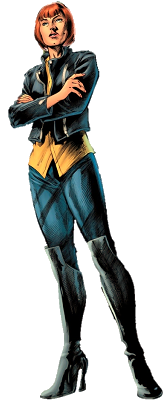
Lana Lang is a fictional character appearing in American comic books published by DC Comics, most often associated with Superman.
Smallville is an American superhero television series developed by writer-producers Alfred Gough and Miles Millar, based on the DC Comics character Superman created by Jerry Siegel and Joe Shuster. The series was produced by Millar/Gough Ink, Tollin/Robbins Productions, DC Comics, and Warner Bros. Television. Initially broadcast by the WB, the show premiered on October 16, 2001. After its fifth season, the WB and UPN merged to form The CW, the series' later United States broadcaster until its tenth and final season ended on May 13, 2011.
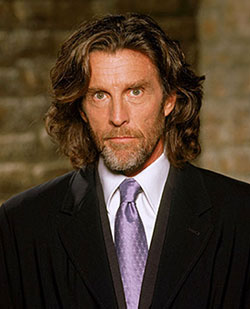
Lionel Luthor is a fictional character portrayed by John Glover in the television series Smallville. The character was initially a special guest in season one, and became a series regular in season two and continued until being written out of the show in season seven. The character returned to the show in season ten again in a special guest role as a parallel universe (Earth-2) version of the character. In Smallville, Lionel Luthor is the father of Lex Luthor, and founder and CEO of LuthorCorp. Lex Luthor's father was first introduced in Superman comics by Jerry Siegel in 1961 and has since appeared in other Superman-related media under different names. Smallville is the first appearance in which the character has been an intricate part of a Superman adaptation. Series developers Alfred Gough and Miles Millar created Lionel Luthor for Smallville to provide an antithesis to the parenting style of Jonathan Kent and Martha Kent. In the DC Comics, Lex Luthor's father was originally named Jules Luthor, but later was renamed Lionel Luthor some time after Smallville. He debuted in Superman's Girlfriend, Lois Lane #23 and was created by Jerry Siegel and Kurt Schaffenberger.
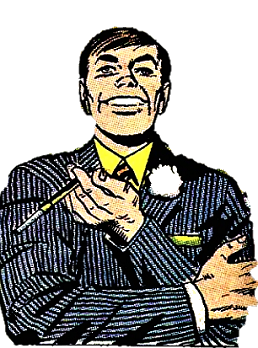
Morgan Edge is a fictional character appearing in American comic books published by DC Comics. Originally a supporting character, he is a media mogul who acquires The Daily Planet and employs Clark Kent as a television journalist for his WGBS TV network. After the Crisis on Infinite Earth series which led to a revision of the DC Universe, the character was a leader of Intergang.

Perry White is a fictional character appearing in American comic books published by DC Comics. He is the editor-in-chief of the Metropolis newspaper the Daily Planet. The character maintains very high ethical and journalistic standards and is an archetypal image of the tough, irascible, but fair-minded boss.

Jonathan Kent and Martha Kent are fictional characters in American comic books published by DC Comics. They are the adoptive parents of Superman, and live in the rural town of Smallville, Kansas. In most versions of Superman's origin story, Jonathan and Martha find Kal-El as an infant after he crash-lands on Earth following the destruction of his home planet, Krypton. They adopt him shortly thereafter, renaming him Clark Kent, "Clark" being Martha's maiden name.
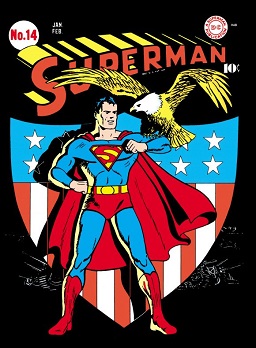
Superman is an American fictional character created by Jerry Siegel and Joe Shuster and featured pervasively in DC Comic books. The character debuted in Action Comics issue #1 in June 1938 and has since become a paradigm for superhero characters.
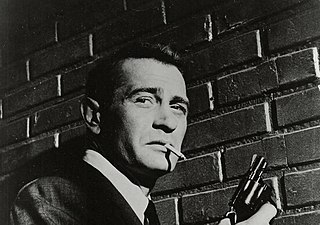
Darren is a masculine given name of uncertain etymological origins. Some theories state that it originated from an Anglicisation of the Irish first name Darragh or Dáire, meaning "oak tree". According to other sources, it is thought to come from the Gaelic surname meaning "great", but is also linked to a Welsh mountain named Moel Darren. It is also believed to be a variant of Darrell, which originated from the French surname D'Airelle, meaning "of Airelle". The common spelling of Darren is found in the Welsh language, meaning "edge": Black Darren and Red Darren are found on the eastern side of the Hatterrall Ridge, west of Long Town. In New Zealand, the Darran Mountains are in the south of the country.

Superman and Lois Lane are a fictional couple and the first superhero comic book romance. Created by writer Jerry Siegel and artist Joe Shuster, both characters including Superman's alter ego, Clark Kent, first appeared in DC Comics' Action Comics #1. They have remained in a complicated relationship ever since. A supercouple, they are among the best known fictional couples and have appeared in multiple media adaptations.

Ron Troupe is a fictional character appearing in American comic books published by DC Comics. Ron Troupe has appeared in several DC Comics media, as such as television series and films.

The pilot episode of the television series Smallville premiered on The WB on October 16, 2001. It was written by series developers Alfred Gough and Miles Millar, and directed by David Nutter. The Smallville pilot introduces the characters of Clark Kent, an orphaned alien with superhuman abilities, and his friends and family who live in the fictional town of Smallville, Kansas. It follows Clark as he first learns of his alien origins, and attempts to stop a vengeful student from killing Smallville High School students. The episode introduces many themes that were designed to run either the course of the season or the entire series, such as the triangular relationships of the main characters.
Clark Kent is the secret alter-ego of DC Comics character Superman.
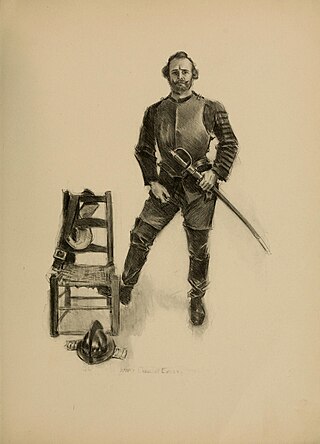
Miles or Myles is a Norman French masculine given name of uncertain meaning. It might have been a changed diminutive of the name Michael that was influenced by miles, the Latin word for a soldier, because of associations with Archangel Michael, the Roman Catholic patron saint of the military. Milo, the variant of the name used most often during the medieval era, might also have been influenced by the Slavic word element -mil, meaning gracious. Myles is a variant spelling in English. In Ireland, the name was used as an English substitute for Irish language names such as Maolra, or Maolmhuire, both meaning devoted to Mary, Maolmhorda, meaning servant of the great, and Maolruanaí, meaning servant of the champion. Development of the name might also have been influenced by the Persian name Mylas, meaning brave. The original name of Miles, an Orthodox Christian saint, was Mylas. The name has been in regular use in the Anglosphere since the 1500s. It was popularized in England by Myles Coverdale, who produced the first complete printed translation of the Bible into English in 1535. In the United States, the name became well-known due to Myles Standish, a soldier who arrived on Plymouth Rock on the Mayflower with the Pilgrims in 1620. American poet Henry Wadsworth Longfellow wrote a popular 1858 poem, The Courtship of Miles Standish, in which the fictionalized Standish is rejected by Priscilla Mullins, who chooses John Alden as her husband instead. Miles and Myles were both more commonly used in the United States than in the United Kingdom by the 1800s due to usage by Irish immigrants to the United States and the influence of Miles Standish. There was an increase in usage from the mid- to late 20th century associated with jazz instrumentalist Miles Davis and with the popularity of fictional characters such as Star Trek character Miles O'Brien, Myles Mitchell, a character on the 1990s American television series Moesha, Miles Edgeworth, a character from the Ace Attorney video game franchise, and fictional Marvel Comics superhero Miles Morales.

Lex Luthor is a fictional character from the television series Smallville. He features from the pilot episode until the season seven finale, and has been played continuously by Michael Rosenbaum, with various actors portraying the character as a child or teen throughout the series. The character of Lex Luthor, first created for comic books by Jerry Siegel and Joe Shuster in 1940 as nemesis of Superman, was adapted to television in 2001 by Alfred Gough and Miles Millar - this is only the third time the character has been adapted to a live action television series. The character has also appeared in various literature based on the Smallville television series, none of which directly continues from or into the television episodes.

Clark Kent is a fictional character and the main protagonist on The WB/CW television series Smallville. The character of Clark Kent, first created for comic books by Jerry Siegel and Joe Shuster in 1938 as the civilian persona of DC Comics' Superman, was adapted to television in 2001 by Alfred Gough and Miles Millar. This is the fourth time the character has been adapted to a live-action television series. Clark Kent has been played continually by Tom Welling, with various other actors portraying Clark as a child. The character has also appeared in various literature based on the Smallville series, all of which are completely independent of the television episodes. As of 2011, Smallville's Clark Kent has appeared in eighteen young adult novels.

The tenth and final season of Smallville, an American television series, premiered on September 24, 2010, and consisted of 22 episodes. It was the tenth and final season to air, and the fifth one to air on The CW television network. The series recounts the early adventures of Kryptonian Clark Kent as he adjusts to life in the fictional town of Smallville, Kansas, during the years before he becomes Superman.
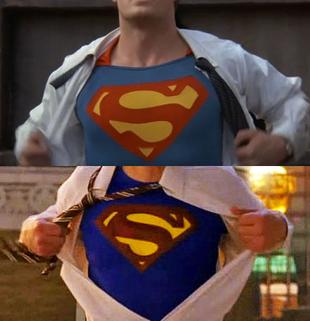
"Finale" is the title of the two-episode series finale of the superhero television series Smallville. The episodes are the 21st and 22nd of the 10th season, and the 216th and 217th episodes overall. The finale originally aired on The CW in the United States on May 13, 2011. The first half was written by Al Septien and Turi Meyer, and directed by Kevin G. Fair, and the second half was written by Kelly Souders and Brian Peterson, and directed by Greg Beeman.
Clarke is a given name that is a transferred use of the surname Clarke. It has been in use as a given name since the 1600s. Usage of the name Clark and its spelling variant Clarke have been influenced by well-known figures such as Clark Gable Usage for girls was influenced by the characters Clarke Betancourt, a character in the 1990 film Mo' Better Blues and later by Clarke Griffin, a character in the television series The 100, which premiered in 2014.

















